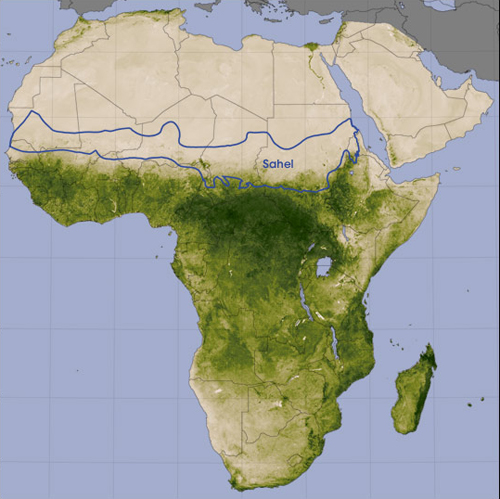(9 am. – promoted by ek hornbeck)

Yacouba Sawadogo was not sure how old he was. With a hatchet slung over his shoulder, he strode through the woods and fields of his farm with an easy grace. But up close his beard was gray, and it turned out he had great-grandchildren, so he had to be at least sixty and perhaps closer to seventy years old. That means he was born well before 1960, the year the country now known as Burkina Faso gained independence from France, which explains why he was never taught to read and write.
Nor did he learn French. He spoke his tribal language, Mòoré, in a deep, unhurried rumble, occasionally punctuating sentences with a brief grunt. Yet despite his illiteracy, Yacouba Sawadogo is a pioneer of the tree-based approach to farming that has transformed the western Sahel over the last twenty years.
Transformed the western Sahel! And I gave up the Sahel for dead 10 years ago! But was there any real basis for this apparently very good news?
Yes indeed!
“In the drought years, people found themselves in such a terrible situation they had to think in new ways,” said Sawadogo, who prided himself on being an innovator. For example, it was a long-standing practice among local farmers to dig what they called zai-shallow pits that collected and concentrated scarce rainfall onto the roots of crops. Sawadogo increased the size of his zai in hopes of capturing more rainfall. But his most important innovation, he said, was to add manure to the zai during the dry season, a practice his peers derided as wasteful.
Sawadogo’s experiments proved out: crop yields duly increased. But the most important result was one he hadn’t anticipated: trees began to sprout amid his rows of millet and sorghum, thanks to seeds contained in the manure. As one growing season followed another, it became apparent that the trees-now a few feet high-were further increasing his yields of millet and sorghum while also restoring the degraded soil’s vitality. “Since I began this technique of rehabilitating degraded land, my family has enjoyed food security in good years and bad,” Sawadogo told me.
And it even gets much, much better!
Amazingly, underground water tables that plummeted after the droughts of the 1980s had now begun recharging. “In the 1980s, water tables on the Central Plateau of Burkina Faso were falling by an average of one meter a year,” Reij said. “Since FMNR and the water-harvesting techniques began to take hold in the late 1980s, water tables in many villages have risen by at least five meters, despite a growing population.”
Studies have documented the same phenomenon in some villages in Niger, where extensive water-harvesting measures helped raise water tables by fifteen meters between the early 1990s and 2005.
Water tables in Burkina Faso and Niger have risen by 5 meters and even 15 meters! And it’s mostly illiterate farmers digging holes and adding a little manure!
That’s grass-roots activism that I can believe in!
And meanwhile, what kind of “leadership” can Africa expect from the Leader of the Free World?

5 comments
Skip to comment form
Author
The Great Green Wall of China!
http://www.care2.com/causes/gl…
would you cross-post this?
this is brilliant!
& what i’ve suspected for some time now
if we teach organic farming to other people…
basically, get rid of monsanto & other big-ag corps
we could easily turn this weather pattern around.
deserts only worsen the conditions in surrounding areas
it takes moisture to call moisture (clouds)
organic farming, using every available means to grow soil will within 5 years increase the soils moisture retaining ability, providing better growing conditions for whatever seed you’re planting.
the more crops you produce, the more animals you can afford, the more manure you produce, the more crops you produce……
… and as the only approach that offers promise, of course when USAID action impacts on Seeds of Development approaches, it is primarily to try to undermine them in order to protect corporate income streams.